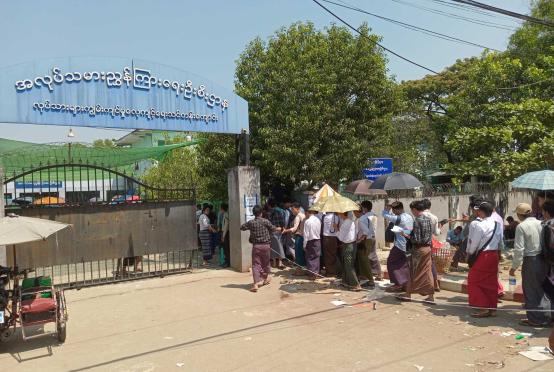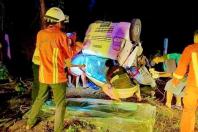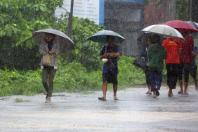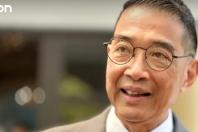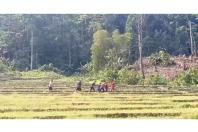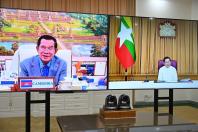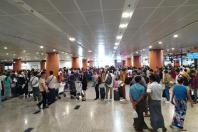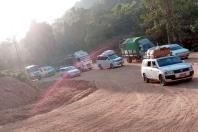Early voting for the 2020 General Election has begun and has so far been marred by numerous controversies.
Despite the constitution and election laws protecting the privacy of the voter, these protections have not been enforced in the mobile, early voting stations for the elderly voters.
vote2.jpg
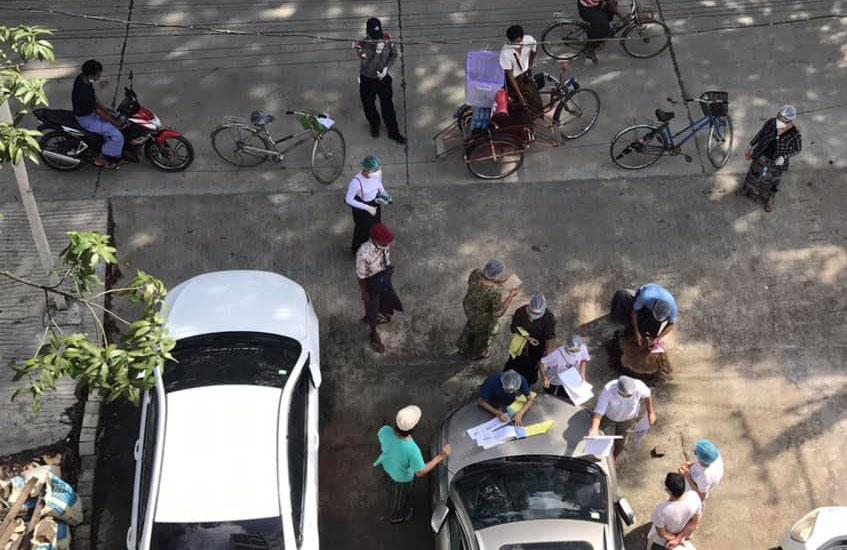
Advance voting underway at a ward in North Dagon Township. (Photo Ma May Soe)
Program Manager Ko Min Thu Naung, from the Myanmar Network for Free and Fair Elections (MYNFREL), a non-profit organization observing elections in five states and regions including Yangon, states that, "Most places we are observing see the issue with voter anonymity. There are no conditions to indicate that vote privacy is being protected."
Respective commission branch staff in wards and villages will be carrying out early voting for over 60 voters from October 29 to November 5 to protect them against COVID-19.
The Union Election Commission (UEC) announced on October 10 that townships with dense populations and those under the Stay-at-home program will have their votes collected on a door-to-door basis while the rest are to cast their ballots in local commission branches.
One of the photos that went viral on social media regarding controversies in advance voting. vote3.jpg
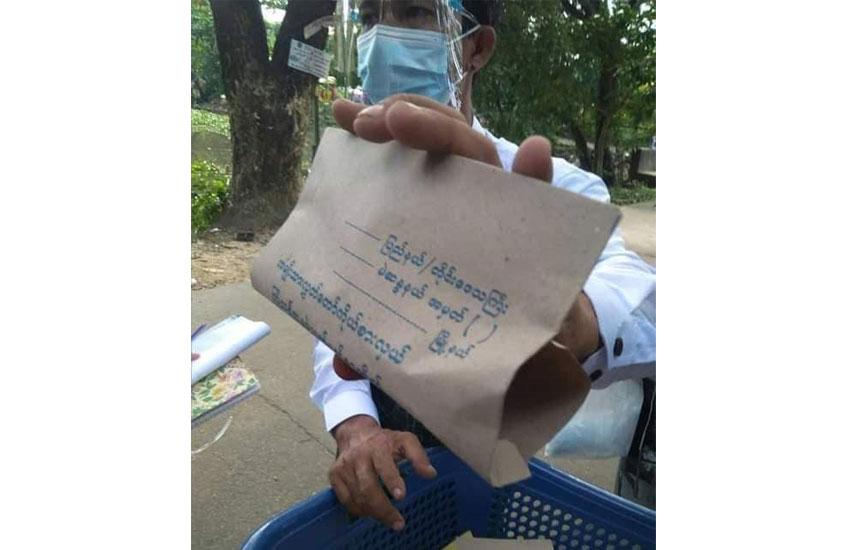
Yangon, a region where over 70 percent of the nation’s total COVID-19 patients reside and with 44 townships under the Stay-at-home order, will be conducting a door-to-door service while a few areas have decided to set up temporary polling booths.
The online news mill as well as on-field news coverage report that in some places, despite putting votes inside of UEC-sanctioned ballot boxes, voters are being closely watched by people standing nearby. Additionally, voting is being conducted in the presence of commission members.
"The voting is supposed to be secret. Sealed envelopes and special zones for voting are put in place to maintain the secrecy of voting. Secrecy is the main thing missing from early voting," said regional parliament candidate for Kamaryut Township and People's Party (PP) member U Ye Naing Aung.
Chapter 9 section 391 (d) of the 2008 constitution states that a secret balloting must be practiced while Chapter 9 section 38 of the election lawit emphasizes it further by necessitating security to protect voter anonymity.
"Secret balloting is a basic right of a citizen because voters need to be protected from those that would threaten and target the voter for not voting for their favored party," said Ko Min Thu Naung.
vote5.jpg
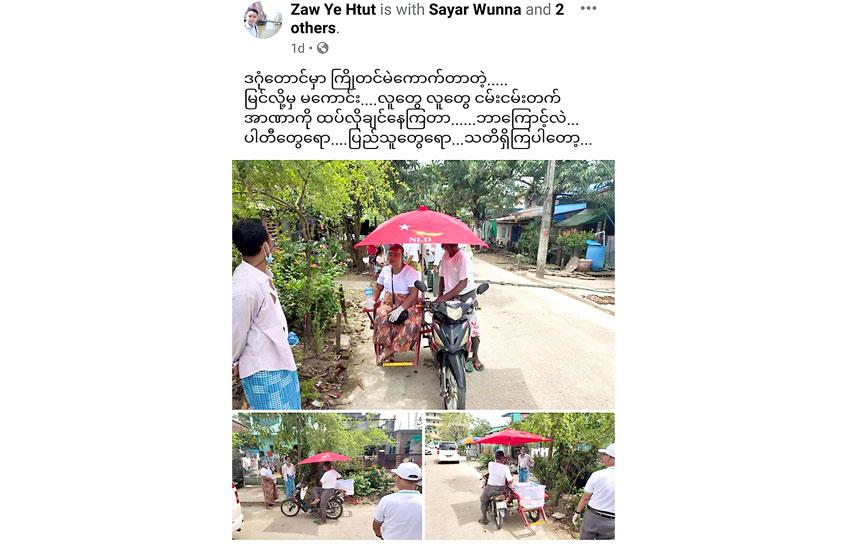
One of the photos that went viral on social media regarding controversies in advance voting.
According to Myanmar’s Network for Free and Fair Elections, in addition to Yangon Region, Shan and Kayah States also saw infringements of secret balloting and voter anonymity.
"It is against the directives. This shouldn’t happen. There are no reasons why the vote should happen in front of us. Voting should happen in anonymity," said U Thein Hlaing, chairman of the South Yangon District branch of the UEC.
Controversies also surround representatives from parties that choose to don party logos while showing up at early voting stations.
One of the photos that went viral on social media regarding controversies in advance voting. vote6.jpg
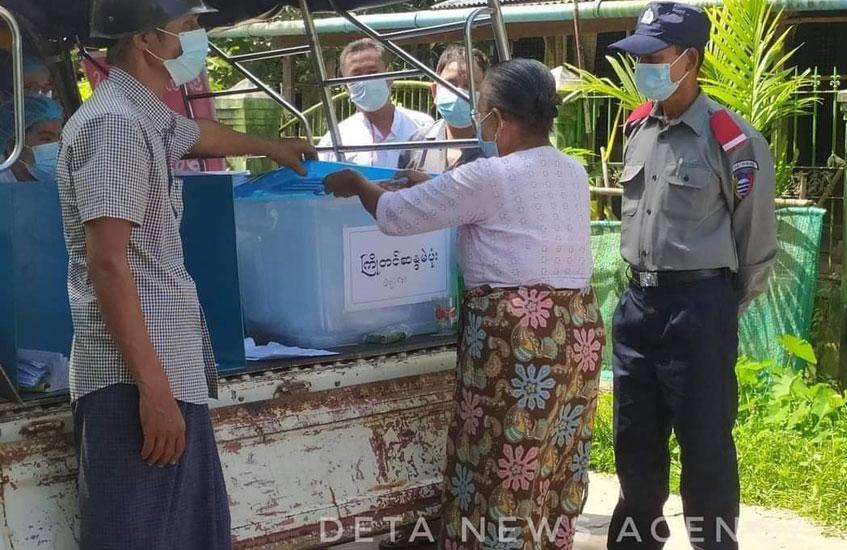
Union Solidarity and Development Party (USDP) candidate for Lower House U Min Thein Tun said to an online media on October 29 that in No.8 ward, Mayangone Township, a person with the National League for Democracy (NLD) logo wearing a farmer's hat was found and that he had submitted the case to the township commission to take action under extant laws.
Regarding this case, NLD's spokesperson for the election campaign team Dr Myo Nyunt said that while there are indeed laws against using the party logo, flag and other peripherals on the Silent Day, there are no laws banning using them during early voting.
"We asked the UEC first for this answer", said Dr Myo Nyunt.
Contrary to the comment by NLD’s spokesperson, UEC announced on October 25th that clothes and accessories bearing logos of political parties should not be worn when coming to the early voting stations.
Section 61 of the election law also enforces this law through a one year prison sentence, a fine of not more than one lakh, or both in order to deter actions that constitute attracting voters and campaigning within 500 yards of the polling station.
"Even we, the candidates, cannot use the party logo, uniform and everything else within 500 yards of the polling station as it will constitute intimidation or attracting the voters. Now it is the COVID period and in an early voting situation for it, we are seeing a lot of those things. When those things are found, instead of respective parties and organizations being strict with it, they are going as if those things are exception to the laws and are breaking the law themselves," said Botahtaung Township Pyitthu Hluttaw candidate Daw Hnin Hnin Hmwe from the Democratic Party for a New Society (DPNS).
Such are the accusations against the ruling NLD party. Additionally, NLD is also trying to sue the polling station representative of the USDP candidate in Hlaegu for using fake seals and stamps on October 30th.
The mobile advance voting group was along Pan Myo Taw Road, Myoma Ward, Hlaegu Town, when it was found that a commission member had used a fake rubber stamp without the UEC logo, of which it was claimed to have come from the USDP candidate's representative, according to NLD's Hlaegu Township Pyitthu Hluttaw candidate U Thein Tan.
He said that the details of the matter have been submitted to the party's central and regional teams, as well as saying that he now waits whether the local commission takes action against the person that used a fake.
Apart from aforementioned disagreements between parties, there are also instances of possible vote manipulation between commission members and voters across some states and regions.
An elderly woman cast vote on top of a plastic stool in Tharkayta Township. (Photo - Myo Htet Paing)vote7.jpg
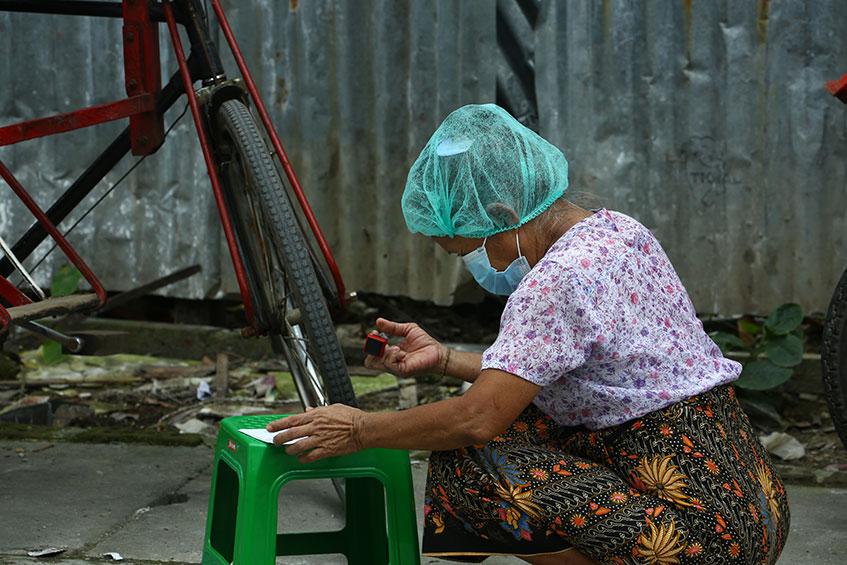
Among those eligible voters outside of their home region, military personnel and their families, students and other professionals, prisoners, inpatients and anyone that are officially abroad have casted their votes since early October.
Union and regional government members, commission members from states and regions as well as others that need to as per the demands of their duties, will cast their votes between October 29 to November 7.
It will also be the same for any that cannot go back to their home regions, over 60 years old voters from densely populated Stay-at-home townships as well as in quarantine centers will cast advance votes between October 25 to November 7.
The very beginning of advance voting for the over-60 elderly voters on October 29th, 2020 saw the most number of incidents where votes were cast against the wishes of the voters as the ballot envelopes were torn, scratching a mark with a ballpen instead of stamping a seal.
In Kyun Yin Village, a crowd quickly gathered after news came about that for those that are not able to cast their own votes, instead of letting an immediate family member carry it out, the local election commission chair took it upon himself to cast their votes but for a different party.
Ko Aung Khine Soe, from Kyun Yin Village, said,"The news spread that green was being stamped instead of the vote for red. The quarrel with the commission began from there."
In several townships within Yangon, Sagaing and Ayeyawady Regions, voters and party candidates reported instances of envelopes having holes, torn, not glued-shut and so on.
On October 22, the Dagon Township branch of the election commission in Yangon received 58 advance votes that were unsealed from the 905th military engineer platoon, and were subsequently voided.
On 27 and 28, advance votes from voters away from home via form (15) arrived to the Dagon Township commission. All 30 of those small envelopes were open and were also not counted.
Magway Region's Chief Minister Dr Aung Moe Nyo posted on Facebook that on October 29, advance voting in Zee Kyun and Kan Hla Village Tracts were being done with pens.
"Are votes purposely made to be void and rejected? Over 60 years old have to vote and they are being asked to doodle instead of stamping," said Dr Aung Moe Nyo.
The UEC had issued a statement, in an attempt to quell criticisms that arose from a storm of controversies within the first two days of voting, on October 30.
It said that votes will still be counted if it has a ballpen with a correct sign in the boxes, if the votes have polling station chief's signature or the local commission branch's stamp seal on the back or the signature and name of the person in-charge of issuing the ballot paper even if the envelope containing the ballot paper and the ballot paper itself do not match, provided that all other procedures were done correctly.
The statement also said that in attempts to collect advance voting from a multitude of households with over-60 voters, there have been many such above mentioned circumstances and that those votes will not be voided.
It goes on to say that open envelopes or if during the gluing process the ballot paper gets smudged or even when ballots were torn during the process of opening up the envelopes, the votes will still be counted.
"It is welcomed that the UEC recognizes that because the rights of the voters were almost lost. It is a good example to take responsibility at a time like this," said election observer Ko Min Thu Naung.
But on the other hand, some candidates find it as a breach of rules already explicitly set in place.
Transporting the advance voting ballot box in Thingangyun Township. (Photo - Myo Htet Paing)vote8.jpg
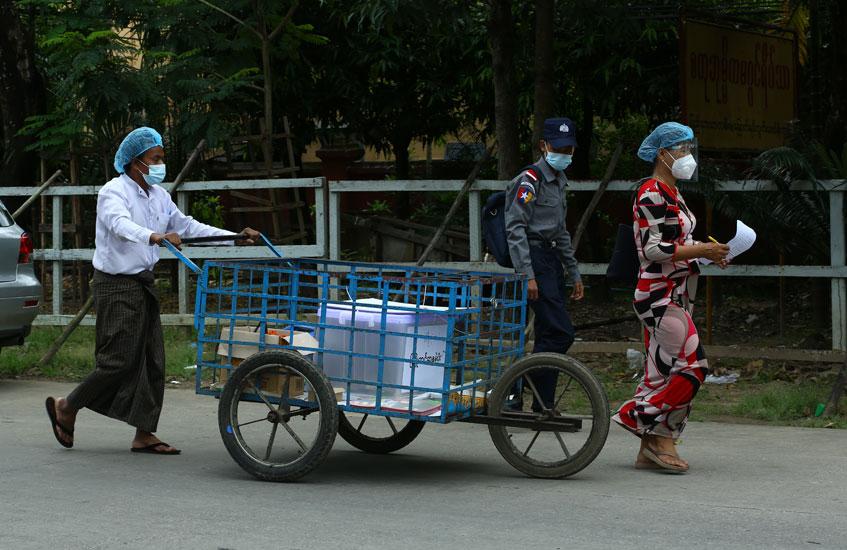
"When voters come, there may be young people, there may be old people. Everyone is equal in their right to vote. They cannot be allowing exceptions because they are over 60 years old and they made mistakes and voted with ballpens. The voting rights that come with 18 years of age and all the way through must be equal. You cannot just go back on your own regulations just because being old or that there are too many people. This is an election and in elections, the problem with uncounted votes is the biggest," said Kawhmu Township Pyitthu Hluttaw Candidate and chairman of the United Nationalities Democratic Party U David Hla Myint.
According to election law section 66 (c), counting of each vote must be done in the presence of polling station staff, witnesses and party representatives. There are 9 types of votes that are to be voided; no marks exist on ballot that the commission do not officially recognize, no signature from the polling station chief, voting for more than one candidate, voting for zero candidates, unclear vote, decision by the polling station chief that the vote is a fake, any markings that the voters may recognize, torn or ballots pre-announced by the commission as void.
"It is clear in the first place what votes are not supposed to be counted. It should be done according to the rules. The decision to say that's okay is just the UEC deciding on their own. They cannot decide by themselves. It also depends on parties participating in the election and the voters. The rules are already set and previously, they will say no but this time around they can accept it, which all affects the fairness of the election," said U David Hla Myint.
DPNS candidate Daw Hnin Hnin Hmwe said, "There is a lot wanting from the commission's laws. We are seeing loose laws that they can at any time adjust it loosely."
Candidates and observers also criticized that despite utilizing the mobile advance voting system to protect elderly voters and prevent spread of COVID-19, the situation in many townships is that the six feet social distancing rules are not enforced.
Ko Min Thu Naung, MYNFREL's Program Manager, says that if advance voting cannot handle social distancing safety well, it might cause voters to lose confidence in the safety on the actual voting day on November 8, causing the rate of voting to drop.
One of the photos that went viral on social media regarding controversies from advance voting.vote9.jpg
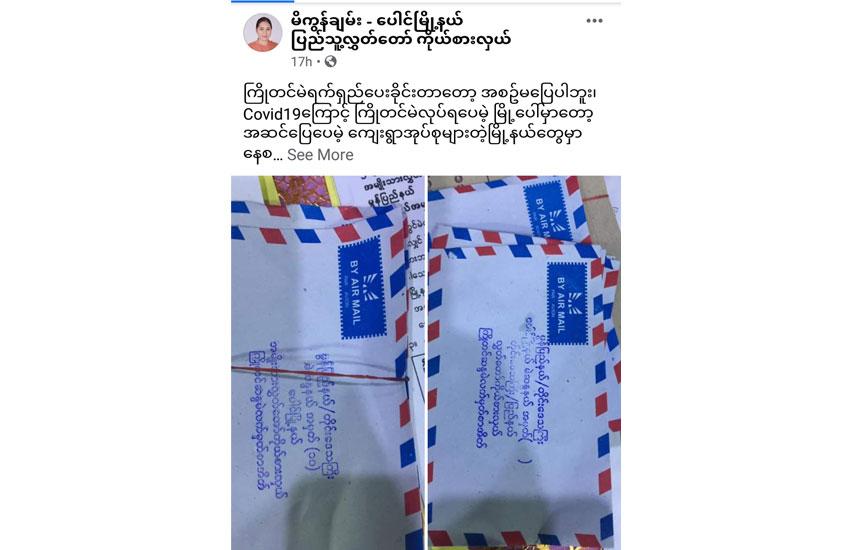
UEC member U Myint Naing has said that as it is one week away from the general election and COVID-19 patients still number near a thousand daily, discussions have been made with the Ministry of Health & Sports, to learn preparations of countries that have held the election during the COVID period.
Despite such assurance, criticisms exist as the commission is unable to thoroughly meet and discuss with political parties and civil societies as to their efforts regarding preparations for election day as well as the advance voting process.
"This process (of early voting for voters over 60) and other election day preparations are all one-sided decisions by the UEC. They did not discuss it with anyone; not political parties, not civil societies. What I mean is that because they didn't do that thoroughly, weaknesses and errors are happening constantly. Weaknesses and errors create loss of trust in the voting process. There will be suspicion. What follows after the suspicion will be the responsibility that the UEC has to bear," said People Party's General Secretary U Yan Naing Aung.

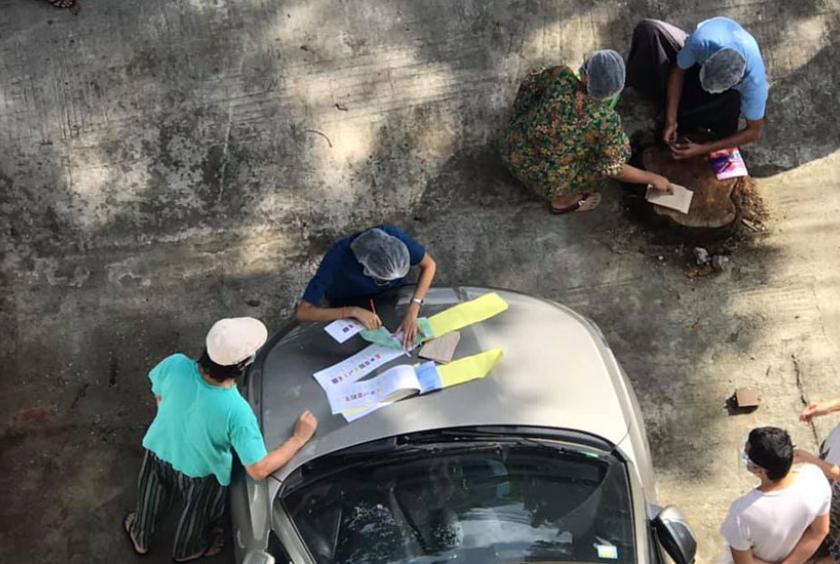
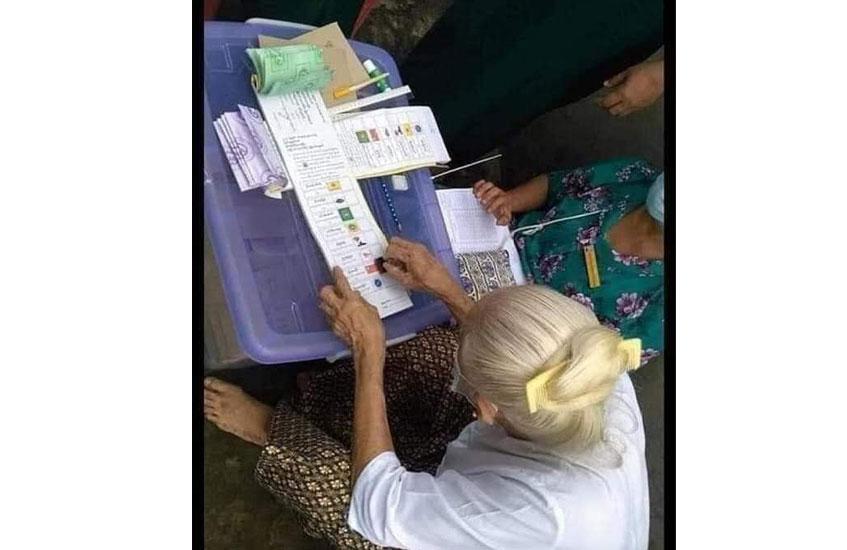
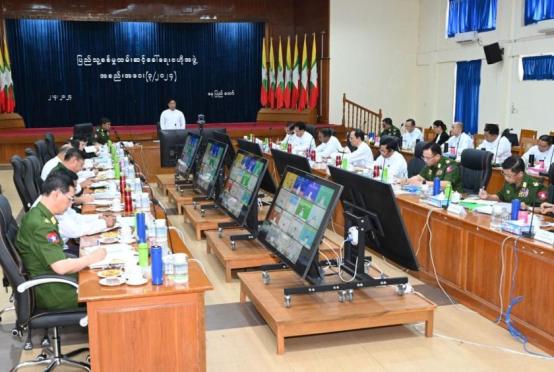
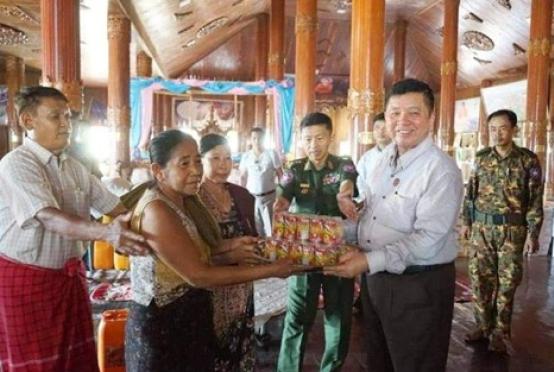
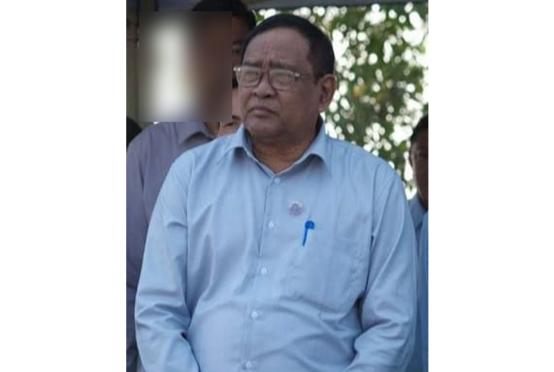
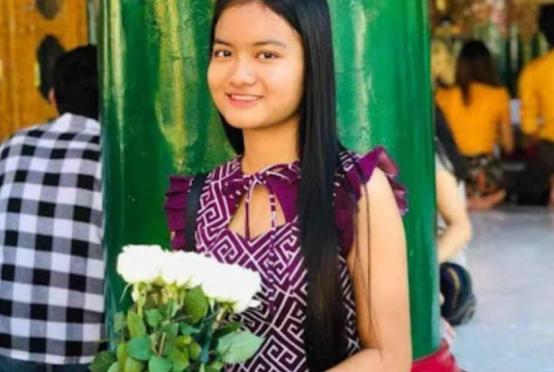
![[Photo credit: Shwe Yoathlwar charity group]](https://elevenmyanmar.com/sites/news-eleven.com/files/styles/frontpage_nodequeue_small_img/public/news-images/plaza.jpg?itok=cFW4kT-E)
